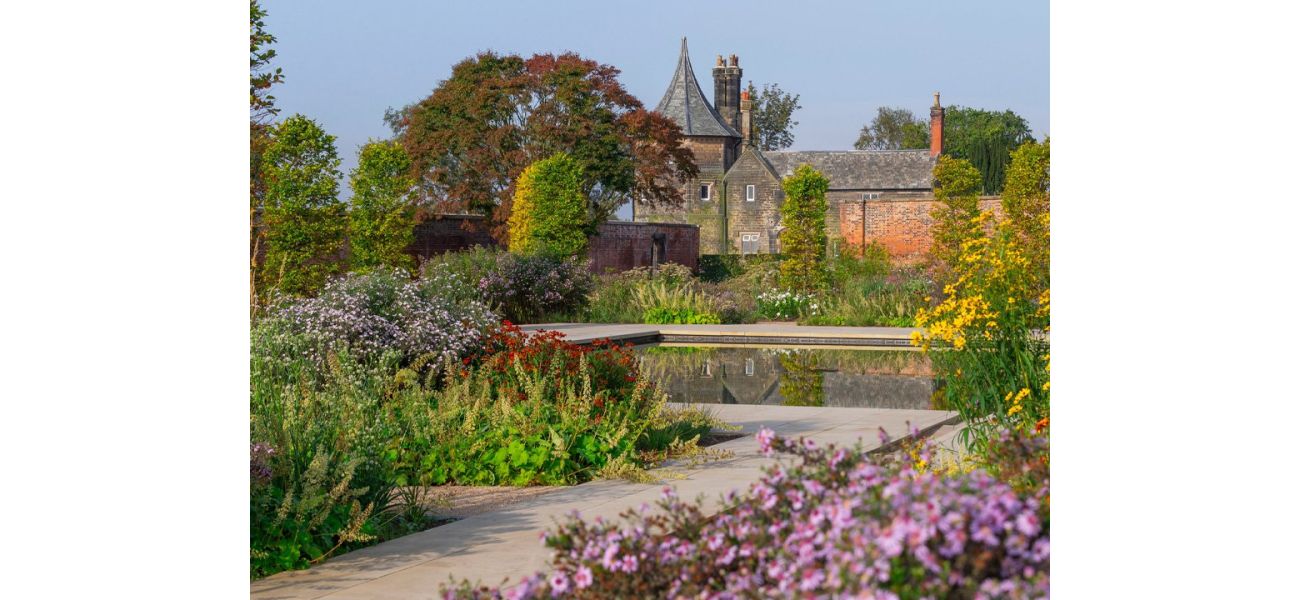By 2075, UK's climate will become hotter and drier, except for one big city.
Britain's wettest city is known as the 'rainy city'.
September 29th 2024.

The lush greenery of the Paradise Garden at RHS Bridgewater may soon have less rainfall, according to the experts at the Royal Horticultural Society. They have predicted that as climate change continues to affect our seasons, the entire UK will experience hotter and drier weather. However, there is one exception – the city of Manchester, known for its reputation as the "rainy city."
Manchester, with its 150 rainy days on average per year, takes the title of the rainiest city in England. However, when compared to the rest of the UK, it falls behind Glasgow, which has 170 rainy days per year. This is due to the westerly winds that bring low pressure systems from the Atlantic, causing Manchester to bear the brunt of the rain in the north west.
The Royal Horticultural Society has taken note of this and is now planning for the future. They have modelled how global warming will affect their properties until 2075 and have found that while all their gardens will experience hotter and drier summers, Manchester's climate will remain stable. In fact, the RHS Bridgewater garden in Salford, which is being earmarked for trees and plants that thrive in wetter climates, has the most stable climate out of all their gardens.
Species such as oaks, birches, and beeches, which have been growing in Britain for centuries, are now facing challenges in the south of England due to the changing climate. That's why they are being considered for the new botanical garden at RHS Bridgewater, which aims to preserve a wide range of species. Domestic gardeners across the country are also adapting to the changing weather, with sales of water butts and greenhouse shades increasing in 2024, despite a wet and rainy summer.
According to the Met Office, this summer was the coolest since 2015, but it would have been considered warmer than average during the years 1961 to 1990. Surprisingly, the rainfall was actually 5% below average. The RHS, with its five gardens in England, is well-equipped to sustain species in a range of climates. Jon Webster, the curator of RHS Rosemoor in Devon, has mapped out the expected changes in temperature and rainfall until 2075.
He explains that the RHS Bridgewater garden has the most stable climate out of all their gardens. "We saw hotter and drier summers in most cases, whereas RHS Bridgewater remained fairly stable in its climate," he says. "It has taken the mantle of the wettest garden in the RHS from us," he adds. As the other four gardens become drier, certain plant collections, including 130 varieties of rhubarb, rhododendrons, and gooseberries, have already had to be moved north to Bridgewater from RHS Wisley in Surrey.
But the RHS is not stopping there. They have plans for new botanical gardens at Bridgewater and RHS Hyde Hall in Essex. As Webster explains, "Oaks, which were once not considered a tree for UK arboretums, are now becoming a real contender due to the drier, hotter climate. On the other hand, beeches and birches are suffering, while exotics like Magnolia grandiflora, native to the southern US, are thriving at Wisley." It's clear that the RHS is taking proactive steps to adapt to the changing climate and preserve a diverse range of species for future generations to enjoy.
Manchester, with its 150 rainy days on average per year, takes the title of the rainiest city in England. However, when compared to the rest of the UK, it falls behind Glasgow, which has 170 rainy days per year. This is due to the westerly winds that bring low pressure systems from the Atlantic, causing Manchester to bear the brunt of the rain in the north west.
The Royal Horticultural Society has taken note of this and is now planning for the future. They have modelled how global warming will affect their properties until 2075 and have found that while all their gardens will experience hotter and drier summers, Manchester's climate will remain stable. In fact, the RHS Bridgewater garden in Salford, which is being earmarked for trees and plants that thrive in wetter climates, has the most stable climate out of all their gardens.
Species such as oaks, birches, and beeches, which have been growing in Britain for centuries, are now facing challenges in the south of England due to the changing climate. That's why they are being considered for the new botanical garden at RHS Bridgewater, which aims to preserve a wide range of species. Domestic gardeners across the country are also adapting to the changing weather, with sales of water butts and greenhouse shades increasing in 2024, despite a wet and rainy summer.
According to the Met Office, this summer was the coolest since 2015, but it would have been considered warmer than average during the years 1961 to 1990. Surprisingly, the rainfall was actually 5% below average. The RHS, with its five gardens in England, is well-equipped to sustain species in a range of climates. Jon Webster, the curator of RHS Rosemoor in Devon, has mapped out the expected changes in temperature and rainfall until 2075.
He explains that the RHS Bridgewater garden has the most stable climate out of all their gardens. "We saw hotter and drier summers in most cases, whereas RHS Bridgewater remained fairly stable in its climate," he says. "It has taken the mantle of the wettest garden in the RHS from us," he adds. As the other four gardens become drier, certain plant collections, including 130 varieties of rhubarb, rhododendrons, and gooseberries, have already had to be moved north to Bridgewater from RHS Wisley in Surrey.
But the RHS is not stopping there. They have plans for new botanical gardens at Bridgewater and RHS Hyde Hall in Essex. As Webster explains, "Oaks, which were once not considered a tree for UK arboretums, are now becoming a real contender due to the drier, hotter climate. On the other hand, beeches and birches are suffering, while exotics like Magnolia grandiflora, native to the southern US, are thriving at Wisley." It's clear that the RHS is taking proactive steps to adapt to the changing climate and preserve a diverse range of species for future generations to enjoy.
[This article has been trending online recently and has been generated with AI. Your feed is customized.]
[Generative AI is experimental.]
0
0
Submit Comment





